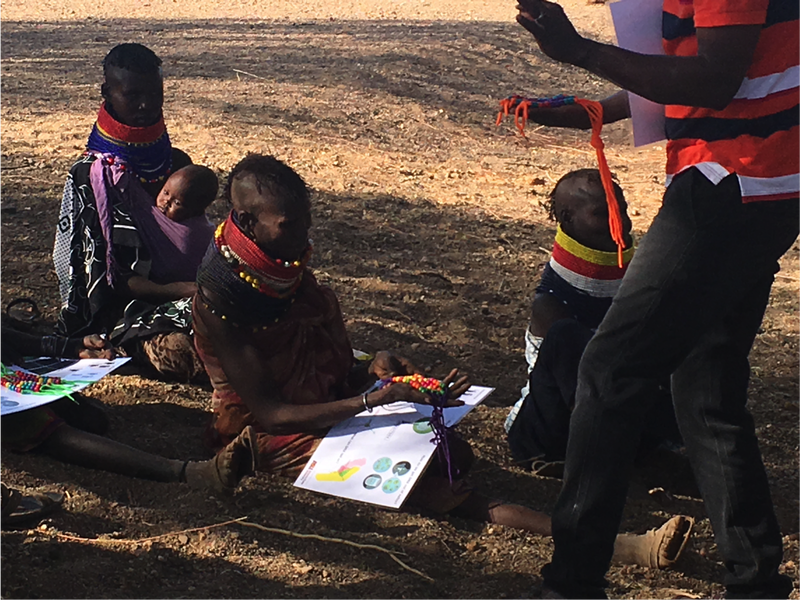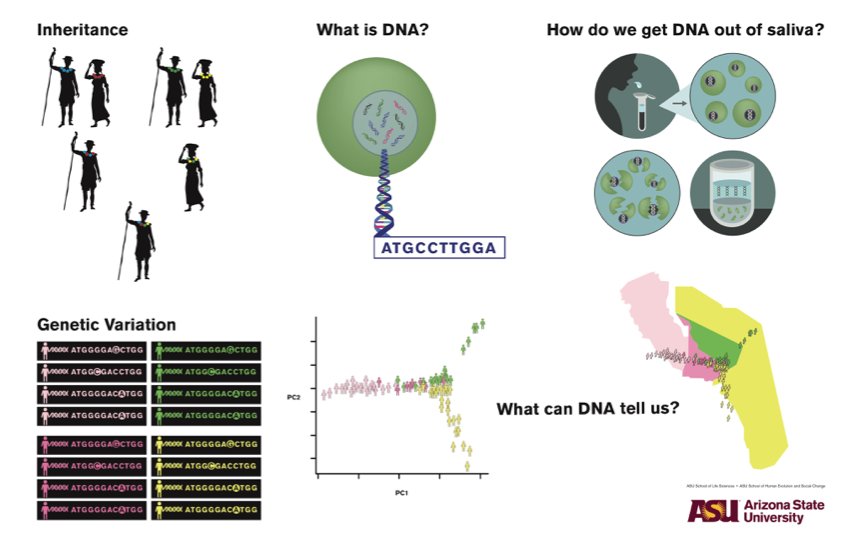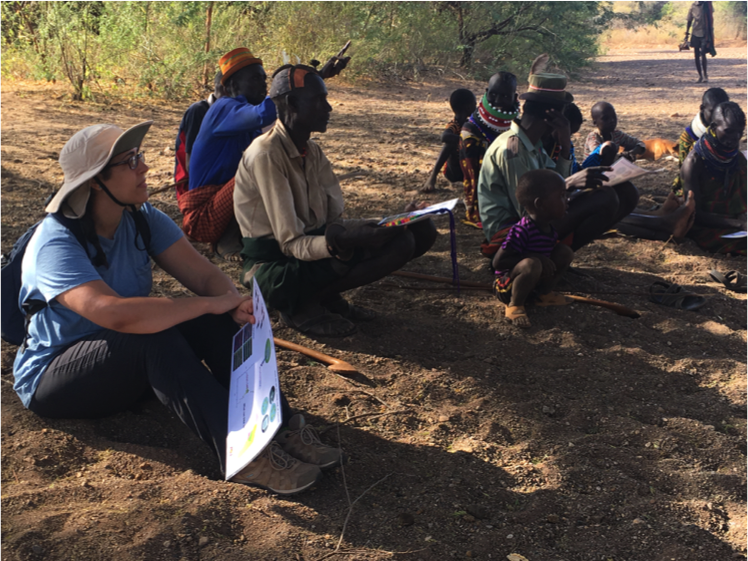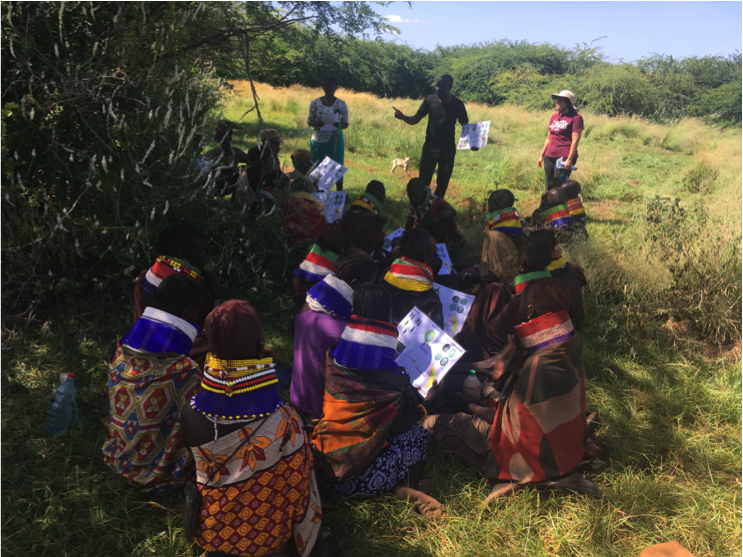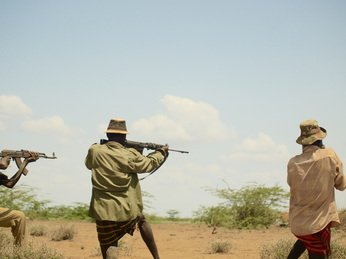Kenyan field research assistant, Mohamed Noor publishes a blog post on the tensions underlying community lands and conservation efforts in arid pastoralists.
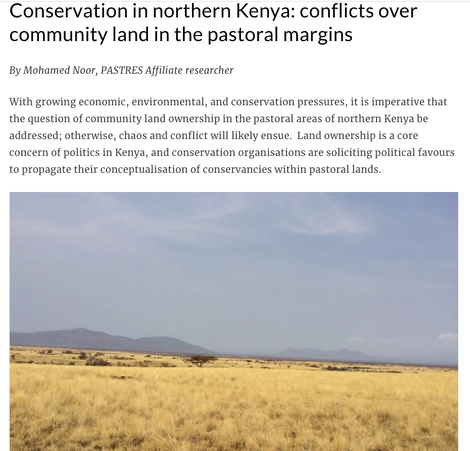
Mohammed was born and raised among the pastoral communities of Isiolo, Kenya. For the last nine years, he has been working as a communications research and development professional, currently with the Drylands Learning and Capacity Building Initiative and the Pastoralist Parliamentary Group in Kenya. As a PASTRES research affiliate at the University of Sussex, Mohammed is investigating issues pertaining to land grabbing and large development initiatives in pastoral areas. He is developing a PhD project exploring the use of novel technologies, such as blockchain, as a means of legitimizing pastoral rights to common land use. Mohamed holds a BA in Sociology, Communications, Armed Conflict and Peace Studies from the University of Nairobi.
Read his blog post here
Situating anthropological genetics within local beliefs in pastoral Kenya
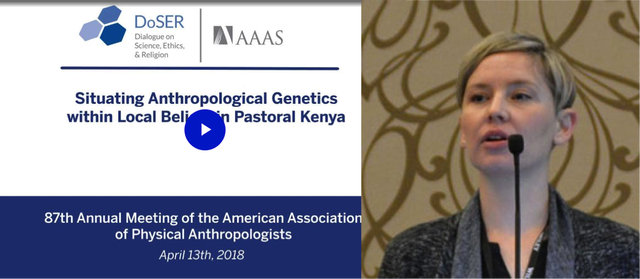
Carla Handley presents at the AAAS Dialogue on Science, Ethics and Religion (DoSER) sponsored session at the AAPA 2018 meetings, session "Biological Anthropology and Dialogue with Diverse Publics"
Situating anthropological genetics within local beliefs in pastoral Kenya
CARLA HANDLEY, SARAH MATHEW, ANGELA TARAVELLA, ANNE STONE and MELISSA A. WILSON SAYRES.
A number of recent publications, such as 2014’s Guidelines for genomics work on vulnerable populations (H3Africa) and the 2017 San Code of Ethics, highlight comprehensive and culturally sensitive research practices aimed at improving local community inclusion. These formal documents represent a growing recognition that researchers should integrate local participants throughout the scientific process - from proposal conception, to methodological design, data collection, publication, and educational / knowledge feedback into the community. These are commendable and concrete steps to improve local autonomy and encourage reflection by scientists on best research practices that are culturally acceptable and relevant to study participants.
In 2016 – 2017 we conducted a study measuring genetic variation among the Turkana, Borana, Rendille, and Samburu pastoral ethnic groups of northern Kenya, involving collection of mouth swabs and saliva samples. Methodologies were designed to avoid transgressions against cultural taboos and explicitly required results feedback to participants, that they may find to be educationally, culturally, and socially beneficial. Dissemination materials reflected local languages and engaged participants through readily familiar concepts. This feedback integration allows for communities to be active participants in how research findings are disseminated and culturally-framed, thus helping to maintain and build trust between scientific and local communities.
Situating anthropological genetics within local beliefs in pastoral Kenya
CARLA HANDLEY, SARAH MATHEW, ANGELA TARAVELLA, ANNE STONE and MELISSA A. WILSON SAYRES.
A number of recent publications, such as 2014’s Guidelines for genomics work on vulnerable populations (H3Africa) and the 2017 San Code of Ethics, highlight comprehensive and culturally sensitive research practices aimed at improving local community inclusion. These formal documents represent a growing recognition that researchers should integrate local participants throughout the scientific process - from proposal conception, to methodological design, data collection, publication, and educational / knowledge feedback into the community. These are commendable and concrete steps to improve local autonomy and encourage reflection by scientists on best research practices that are culturally acceptable and relevant to study participants.
In 2016 – 2017 we conducted a study measuring genetic variation among the Turkana, Borana, Rendille, and Samburu pastoral ethnic groups of northern Kenya, involving collection of mouth swabs and saliva samples. Methodologies were designed to avoid transgressions against cultural taboos and explicitly required results feedback to participants, that they may find to be educationally, culturally, and socially beneficial. Dissemination materials reflected local languages and engaged participants through readily familiar concepts. This feedback integration allows for communities to be active participants in how research findings are disseminated and culturally-framed, thus helping to maintain and build trust between scientific and local communities.
Graduate student geneticist Angela Taravella does science outreach in Turkana communities on genetics research methods, using colored beads to illustrate nucleotide sequences.
Andrew Carnegie Fellowship program names 31 scholars to receive $200,000 award
|
I am honored to be selected as one of the Andrew Carnegie fellowship awardees who receive $200,000 to enable their research. The Andrew Carnegie fellowship program by the Carnegie Corporation of New York recognized 31 scholars in 2015 who's work would contribute to understanding the current and future challenges to U.S. democracy and international order. Coverage in NY Times and Huffington Post Press release from the Carnegie Corporation of NY ASU News article describing my research pertaining to the fellowship |
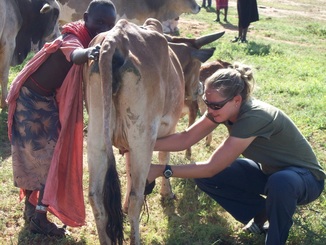
Carla Handley joins the Turkana project as a post doctoral researcher
Handley received her PhD in anthropology from the University of Durham in 2013. She has conducted fieldwork among the Samburu, Borana, and Rendille pastoralists of northern Kenya, examining interethnic conflict and cooperation between these groups using game theory and socio-ecological resilience models.
As a post doctoral researcher on the Templeton Project, Handley will examine the role of cultural boundaries in shaping the scale of cooperation and moral sentiments. For this project she will conduct fieldwork among the Turkana and also continue to work among the Samburu, Borana and Rendille. Such data will be invaluable for testing cultural group selection models for the evolution of human cooperation.
The Turkana project is glad to have Carla Handley join the team. Handley's ethnographic knowledge of multiple pastoral groups in Kenya is an asset for doing the cross-cultural comparative work needed for testing cultural group selection models.
Carla Handley's Homepage
Handley received her PhD in anthropology from the University of Durham in 2013. She has conducted fieldwork among the Samburu, Borana, and Rendille pastoralists of northern Kenya, examining interethnic conflict and cooperation between these groups using game theory and socio-ecological resilience models.
As a post doctoral researcher on the Templeton Project, Handley will examine the role of cultural boundaries in shaping the scale of cooperation and moral sentiments. For this project she will conduct fieldwork among the Turkana and also continue to work among the Samburu, Borana and Rendille. Such data will be invaluable for testing cultural group selection models for the evolution of human cooperation.
The Turkana project is glad to have Carla Handley join the team. Handley's ethnographic knowledge of multiple pastoral groups in Kenya is an asset for doing the cross-cultural comparative work needed for testing cultural group selection models.
Carla Handley's Homepage
Research on Turkana cooperation part of $ 4.9 million grant to ASU’s Institute for Human Origins from the John F. Templeton Foundation
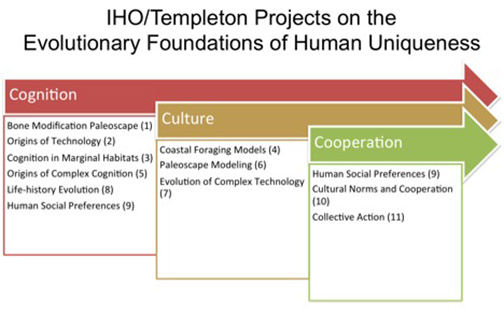
The project “Evolutionary Foundation of Human Uniqueness--Reconstructing Patterns of Cognition, Cumulative Culture and Cooperation” brings paleo anthropologists and archaeologists together with researchers studying the evolution of human behavior and psychology at ASU in 11 linked sub-projects, and is the single largest investment in human origins research.
The Turkana sub-project will focus on the evolution of large-scale cooperation in humans and the role of moral sentiments, cultural norms and prosocial preferences in shaping human ultra-sociality. Read more...
|
Informal justice in small-scale societies like the Turkana suggest that "law" was a key human innovation The New Scientist has an interesting article called "Transformers" written by Colin Barras which identifies the key revolutions, from cooking to writing, that made humans what they are today. Informal justice among the Turkana that I have documented is discussed as evidence that "law" might be one of the revolutions that emerged early in human history making possible trade and other forms of human social exchange. Read the article here. |
Your browser does not support viewing this document. Click here to download the document.
|
|
Is it brave to think like a coward?
|
Chris Walsh, author of "Cowardice: A Brief History" has an interesting take on cowardice in his article in Aeon titled "Why its brave to think like a coward". How the Turkana deal with cowardice is part of the story.
|
Origins event debates the future of violence and humanity, and features Turkana warfare work
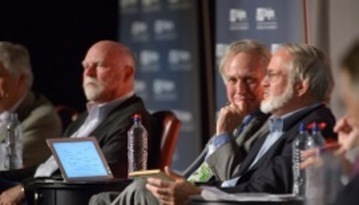
Celebrate five years of intellectual stimulation and excitement with the Origins Project at Great Debate Transcending Our Origins: Violence, Humanity, and the Future. The first panel of the evening, The Origins of Violence, will feature scholars and writers Steven Pinker, Richard Wrangham, Erica Chenoweth, Adrian Raine, John Mueller and Sarah Mathew discussing the development of violence from the brain to world wars. The second panel, The Future: From Medicine and Synthetic Biology to Machine Intelligence, will feature scientists and notable experts Richard Dawkins, Craig Venter, Kim Stanley Robinson, Esther Dyson, Eric Horvitz, George Poste and Randolph Nesse discussing the future of new biomedical and robotic technologies and their impact on humanity. The evening will be moderated by Lawrence Krauss. Read more...
Watch the event
Watch the event
|
|
|
|
|
Scientists come together in a major forum to discuss cultural evolution
The goal of the Ernst Strungmann forum, organized by Peter Richerson and Morten Christiansen was "to explore the role of cultural evolution in explaining human social structure, technology, language and religion". Read more. The edited volume that resulted from the forum provides a guide to the current questions and future directions. A chapter I contributed to the book discusses the role of culture in the transition to intensive small-scale cooperation in humans. |
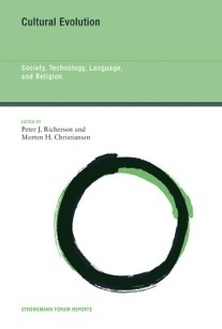
“This ambitious and wide-ranging collection provides challenging theoretical discussions of the mechanisms of cultural evolution, including its complex relationship with biological evolution. It includes some comprehensive and reliable surveys of the current state of knowledge in four relevant domains—social structure, technology, language, and religion—that do not shirk from identifying unsolved problems. It is thus a promising basis on which the ongoing study of cultural evolution can proceed.”
—James R. Hurford, Emeritus Professor of Linguistics, University of Edinburgh |
Paper exploring how the Turkana solve the collective action problem in warfare selected to be F1000 article
Mathew, S. and R. Boyd. 2011. Proceedings of the National Academy of Sciences, 108 (28): 11375-11380
|
F1000 Review by Dustin Rubenstein
Field studies of the mechanisms underlying the formation of non-kin groups in humans are rare. Mathew and Boyd show that in the nomadic Turkana of East Africa, punishment in the form of fines may be an important mechanism underlying the maintenance of warfare and large cattle raiding groups of unrelated community members in this uncentralized human society. Numerous theoretical models and lab experiments have been developed to explain cooperation between non-kin in large human groups. However, very few studies have been conducted to understand the importance of the various mechanisms that lead to the stabilization of cooperation in natural contexts. One possible mechanism that helps sustain cooperation in animal societies is punishment (1). Although punishment in the form of policing of worker reproduction by other workers is common in insect studies (2), examples of punishment in humans outside of the laboratory in naturally occurring populations are rare. The study by Mathew and Boyd has collected valuable quantitative data in the Turkana, a nomadic pastoral society in East Africa. Turkana males raid other communities in large groups of unrelated individuals to steal livestock. This behaviour is especially costly, as 20% of all male deaths are the result of such warfare. Given the risks of warfare, it is not surprising that many young men act as ‘free riders’ by not joining a raid or leaving the party before the fighting begins. Such individuals are sanctioned by the community, often in the form of fines. The authors suggest that this collective corporal punishment could be an important mechanism for preventing free-riding behaviour during warfare in a politically uncentralized human society. Although still rare, these types of field studies are crucial for understanding the nature of human cooperation. References: (1) Boyd et al. Science 2010, 328:617-20 [PMID:20431013]. (2) Ratnieks et al. Annu Rev of Entomol 2010, 51:581-608 [PMID:16332224]. |
